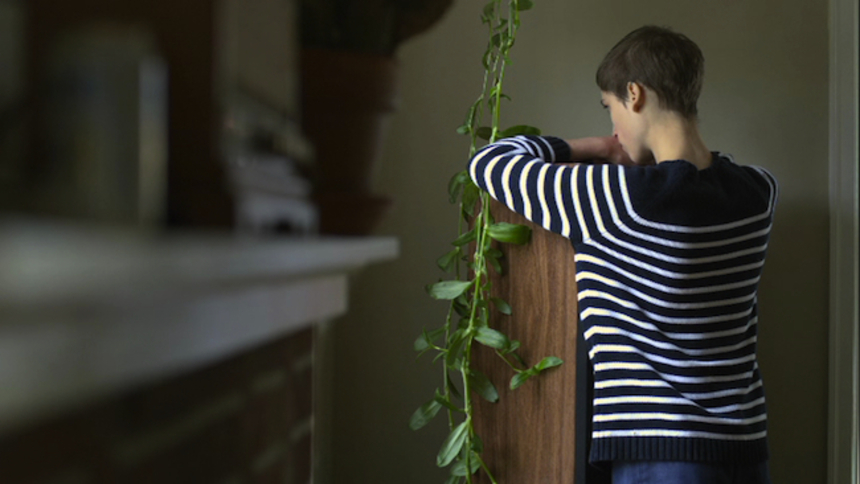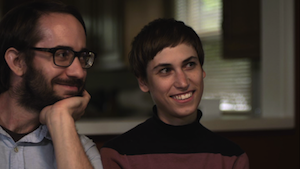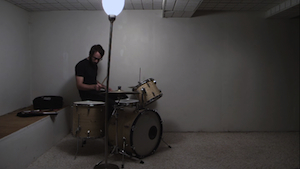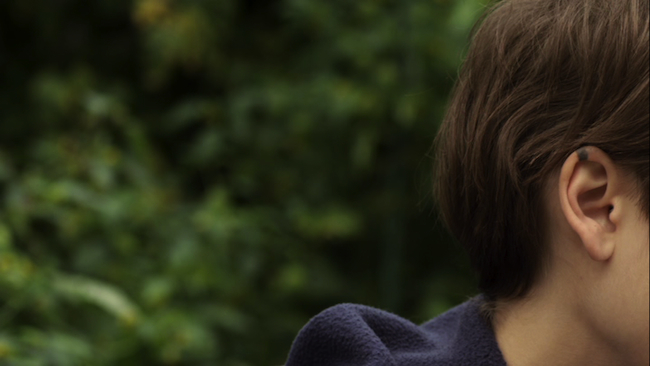Review: The Immediacy of Distance in THE SOUND OF SMALL THINGS

In early February I was stricken with Ramsay Hunt Syndrome, a result of having the Herpes Zoster virus (ringleader of both the Chicken Pox and Shingles gangs) lodge itself in my left ear. As a result of RHS, the left side of my face became completely paralyzed. Those muscles and nerves just fell asleep. I couldn't close my left eye, let alone blink, chew, smile, or swallow. The best picture I can give you is of the Batman villain, Two-Face: A calm, flexible right side, the left, frozen in wide-open disarray. Those first two weeks under the spell of Ramsay Hunt were incredibly bizarre and painful, not only on a physical plane, but especially in an emotional and psychological sense. I was miserable, and everything I did, everything I touched, tasted, looked at, listened to, felt miles away; submerged underwater; out of my grasp despite already being in my grasp. The immediacy of distance was striking. Now in this state it felt near impossible to watch movies, and so I didn't. For two weeks I didn't watch a single frame. Coming out of this submerged reality the first film I did watch was The Sound of Small Things. And within minutes of turning on the film the immediacy of distance between newlyweds Cara and Sam, the way time and space stretched across the frame, tumbled back in on itself, held close and pushed away, was striking.
As you can probably surmise by now, The Sound of Small Things is a film that isn't much concerned with plot, let alone a traditional narrative, though it doesn't stray too far from the familiar three-act structure. I can't label it as no-wave or mumblecore as I feel I'm not educated enough on what those terms mean, if they do mean anything at all. I will say this though: The Sound of Small Things is a film full of something I like to call everyday strangeness... moments of absolute absence... wherein you -- ironically enough -- realize that absence. This is where the mundane, quiet things that you're so used to seeing, touching or doing take on an extra sheen of magic because of that fear you're lost to the world around you. And then that magic, though feeling alien, perhaps a paradox, should be the norm; it should be there all the time. And maybe it is, but you're so distant from it out of... what... Fear? Shame? Judgment? Apprehension?
 Cara (Cara Krippner) and Sam (Sam Hoolihan) don't know each other that well. Their decision to get married is one that could be considered rash, impractical, perhaps even stupid. It is a moment we don't see on screen, but it almost feels as if that choice to get married is as an act of defiance, to go against something (that fear?). When Sam's friends and former bandmates come over to drink and jam, Sam has to explain to them that Cara is deaf. They ask how it happened, and he quickly brushes over some half answer about an accident. He isn't really sure himself. Later, when an ex-flame asks Sam about his marriage he replies, "It's true and it's good." It is an answer that is full of uncertainty as much as it is the most complete and honest answer to anything in the entire film.
Cara (Cara Krippner) and Sam (Sam Hoolihan) don't know each other that well. Their decision to get married is one that could be considered rash, impractical, perhaps even stupid. It is a moment we don't see on screen, but it almost feels as if that choice to get married is as an act of defiance, to go against something (that fear?). When Sam's friends and former bandmates come over to drink and jam, Sam has to explain to them that Cara is deaf. They ask how it happened, and he quickly brushes over some half answer about an accident. He isn't really sure himself. Later, when an ex-flame asks Sam about his marriage he replies, "It's true and it's good." It is an answer that is full of uncertainty as much as it is the most complete and honest answer to anything in the entire film.At home, when Sam puts on some old tracks he recorded, Cara hugs the speaker, embracing the vibration of the sound. When they have sex, sound is cut out altogether, the camera close in on the edge of the blankets, feet shuffling underneath. McLarnan's film is full of moments like this, moments filled with curiosity towards something that should be familiar, or could be familiar; that alone-ness of relationships; the rising and falling, arriving and departing, all within the same instant. It is sweet, it is melancholic, gentle and sincere. All the while tensions build. Sam goes off to his job as a copywriter. Cara stays close to the house, usually reading, oblivious to the heavy air traffic above the house. Much of what we understand of this relationship then comes from the time Sam and Cara are apart, when they choose to isolate themselves from one another in the house. Sam heads to the basement to practice his drumming, something he knows shouldn't bother Cara, who is lying on the couch reading.
 Now I don't want to be painting a picture where these characters seem apathetic. They're not. Though perhaps they fear they are. As far as performances go, these are the kind of enigmatic and special ones you can only get with non-actors. Hoolihan's turn as Sam feels like that of a sad clown -- one we would find in an Italian opera, though here he is without his voice (or is it that he now carries a pair of drumsticks instead?). Appearing like a castaway from a Carl Theodore Dryer silent, Krippner moves through each frame with a splintered defiance and curiosity; yearning to experience... and yet... she isolates herself, removes herself so easily. In the final third of the film when Cara actually does leave, Sam is left to wander. Needing some kind of connection to Cara, he calls her sister, who she has supposedly gone to stay with. McLarnan then subtly pushes and pulls; building to a great dissonance, even when it seems like the couple will come back together. The heavy air traffic above the house now feels even heavier.
Now I don't want to be painting a picture where these characters seem apathetic. They're not. Though perhaps they fear they are. As far as performances go, these are the kind of enigmatic and special ones you can only get with non-actors. Hoolihan's turn as Sam feels like that of a sad clown -- one we would find in an Italian opera, though here he is without his voice (or is it that he now carries a pair of drumsticks instead?). Appearing like a castaway from a Carl Theodore Dryer silent, Krippner moves through each frame with a splintered defiance and curiosity; yearning to experience... and yet... she isolates herself, removes herself so easily. In the final third of the film when Cara actually does leave, Sam is left to wander. Needing some kind of connection to Cara, he calls her sister, who she has supposedly gone to stay with. McLarnan then subtly pushes and pulls; building to a great dissonance, even when it seems like the couple will come back together. The heavy air traffic above the house now feels even heavier. Now if I may once again broaden the scope and context of the review...
Along with Mark Jackson's 2011 film Without, and Frank Rinaldi's 2012 entry Sundowning, McLarnan's film is the third feature debut I've reviewed here at ScreenAnarchy to come out of Slamdance in the last two years. While the two former pictures offer rather transgressive and challenging scenarios of caretakers and their patients (playing various notes of Bergman and Polanski alike) -- something The Sound of Small Things clearly doesn't have -- all three films offer thoughtful, careful portraits of people in intimate, often isolating and intense (whether bursting to the edges of the frame or brewing underneath) settings. Was this a consistent and conscience choice on the part of the Slamdance programmers? Is it a reflection of each film's small budget and production limitations? Or is it just mirroring threads that I've come to pick up on as all three films have resonated with me?
Well, at any rate, McLarnan's first feature is some kind of mini-marvel. It is a film that filters very nuanced, naturalistic dialog and settings through increasingly experimental means and ways. Like Sundowning and Without (plus a handful of other films, including Josh & Benny Safdie's The Pleasure of Being Robbed & Daddy Longlegs, Calvin Reeder's The Oregonian, Bradley Rust Gray's The Exploding Girl, and Aaron Moorhead & Justin Benson's Resolution), The Sound of Small Things gives me hope in the American independent scene -- a scene that can sometimes feel as if it's eaten a part of itself in a rather grotesque attempt at ouroboros (the act of eternal recreation) only to then spit itself back out in a fit of cloying wit and nostalgia (then again, perhaps that is a form of eternal recreation). It is then best to note that The Sound of Small Things is a film that lets one ponder and trace the edges of the frame to new, barely visible horizons. The immediacy of that distance is indeed striking.
The Sound of Small Things had its premiere at the 2012 Slamdance film festival in January. It can next be seen Wednesday, September 12th at the Trylon microcinema in Minneapolis, Minnesota. Peter McLarnan and members of the cast will be in attendance. For more info and to purchase tickets click here. And to keep track of where The Sound of Small Things goes next, please visit the film's Facebook page.

The Sound of Small Things
Director(s)
- Peter McLarnan
Cast
- Sam Hoolihan
- Cara Krippner

Do you feel this content is inappropriate or infringes upon your rights? Click here to report it, or see our DMCA policy.






